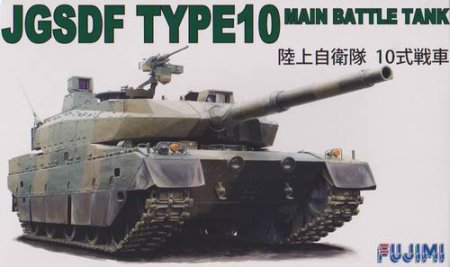|
At the recently held Capcon event in Ottawa, Canada, I was fortunate enough to be the
successful bidder at the event's silent auction for one of Fujimi's brand new 1/72 JGSDF Type 10 MBT kits, graciously
donated to the event by Hobby Link Japan. I had been eagerly anticipating the release of this model ever since hearing
rumours of its release on the Braille Scale discussion board on the Missing Lynx website.
At the time of release, the Type 10 was only just being introduced into service so the
kit represents the "prototype" configuration.
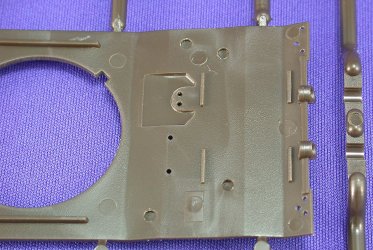
The mystery holes |
The moulding is very crisp, with only a slight bit of flash noted on the drive sprocket
halves. The mould alignment is very good, leaving only the slightest of mould seams to clean up. The delicate tow cable
for the aft hull is an extraordinary piece of moulding. There are however four "mystery" holes that are just barely flashed
over on the exterior surface in the forward area of upper hull, part #3. I'm at a loss as to what these are, as they don't
appear to be ejector pin marks. They almost look like provisioning holes, but there's nothing mounted externally at these
locations. I would STRONGLY recommend back-filling these with cyanoacrylate or other suitable filler prior to closing this
up area, just in case sanding is required in these areas down the line. There are also a few other areas such as aft portion
of the hull sides/skirts which are moulded paper thin. Care will need to be taken with the use of solvent cements in these
areas.
|
Upon my initial perusal, the surface detail looked a bit spartan (i.e. lots of clean facets
devoid of any detail) but in comparison to photos of the actual vehicle, this appears to be appropriate (though I remain
suspicious about the engine deck). Fujimi has continued on with the "not so fine tradition" of many manufacturers in this
scale in moulding the pioneer tools integrally with the upper hull. It baffles me that they would take the effort to give
us 132 separate track pads, but not make the minimal effort to provide a separate shovel, axe and sledge hammer (?????).
The moulded on shovel is abominable by the way. The suspension arms seem quite simplified to me as well, though I suppose
they will be barely visible behind the wheels and skirts.
On the plus side, there is some very nice contour moulding of appropriate parts such as
the canvas cover on the gun barrel, and the rubber dust skirts. I also like the separate part for the various targeting/sight
housings as this provides more flexibility for the modeller who wishes to scratch-build their own optics.
Fujimi has given the modeller a couple of options in regards to the commanders hatch
which has separate parts to be used for portraying opened or closed (if we only had some JGSDF tanker figures to put in
it…..whimper), and the tracks which have the afore mentioned 132 track pads, for those wishing to portray their model in
"road-mode". The bonus here is that they look to be usable on your Trumpeter Type 90 (which does not include track pads)
should you want to display it on a road march and don't mind a little cross-kitting (assuming you can get anything to
stick to those horrible Trumpeter rubber tracks). |
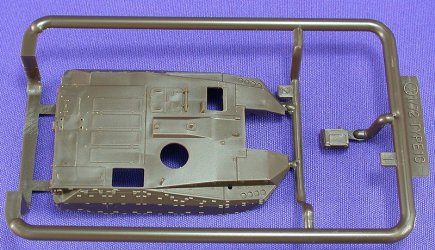
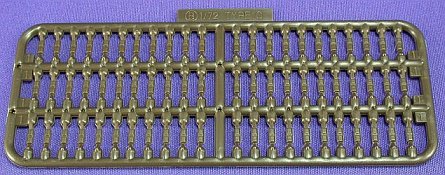
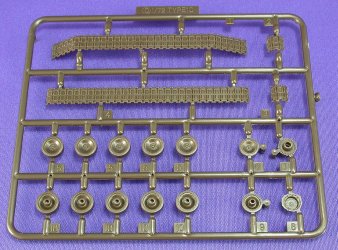
|
The engineering of the parts in respect of the assembly is a little atypical in a couple
of respects. The tracks are a link and length hybrid design, with the curvature around the drive sprocket & idler as well
as coming off the forward and aft roar wheels being moulded into both the major and minor runs. Providing the fit is good,
this should help reduce the tack time spent dealing with tiny parts (important for those of us with age induced eyesight
degradation). Also different from most manufacturers of modern armour, the side skirts are moulded integrally with the hull
sides, so some creativity will be required in respect of painting and later masking the running gear prior to assembly of
hull side parts 1 & 2. I'm not so keen on this design element.
|
I'm somewhat confused by the placement of the headlights on the model. They are biased
towards the centerline which is reflective of the pictures that I've seen of the vehicle with a dozer blade fitted,
however Fujimi do not include the blade assembly in the kit. Photos of the vehicles without the blade fitted have the
headlights placed further outboard. This may be reflective of the "prototype", but I'm just not sure at this point.
There are a wealth of units markings included on the nicely printed decal sheet, but the
instructions only provide placement info for two examples. Unfortunately, the description of the specific units are in
Japanese so I can't really tell you which units they represent. Painting instructions are provided with reference to
Gunze Aqueous and Mr. Colour lines, though only a Mr. Colour reference is provided for the green (those using Aqueous
will have to wing it here). The suggested mix for the tan/brown colour looks correct though I think that it'll have
to be lightened up a fair amount for scale effect.
This is the first bit of modern armour that I've seen from Fujimi, and overall I like what I've seen here.
Though overall I wouldn't quite put them at the standard that Pit-Road set with their marvellous JGSDF vehicle line (i.e.
Types 61/74/90 re-boxed by Trumpeter), in a couple of areas however, like the tracks, Fujimi has definitely bested them.
Hopefully we'll see more modern subjects (with separate pioneer tools….nudge, nudge, hint, hint) from the Fujimi stables
in the near future.
Thanks to Hobby Link Japan, IPMS Ottawa, and my wallet, all of whom played a part in landing the
review sample on my workbench.
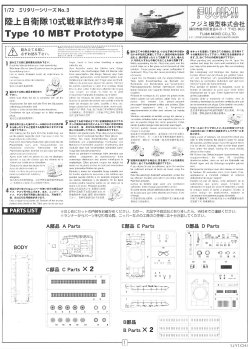
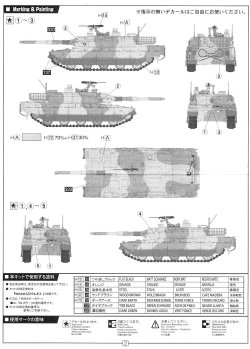
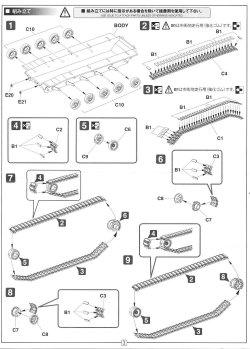
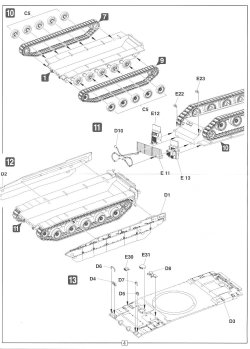
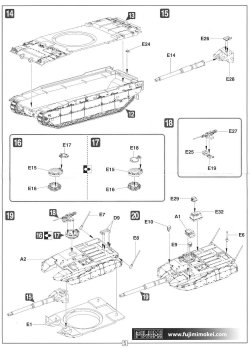
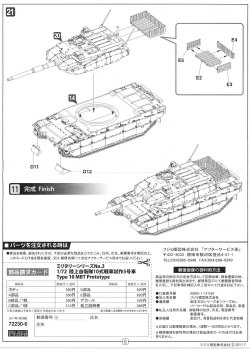
|
